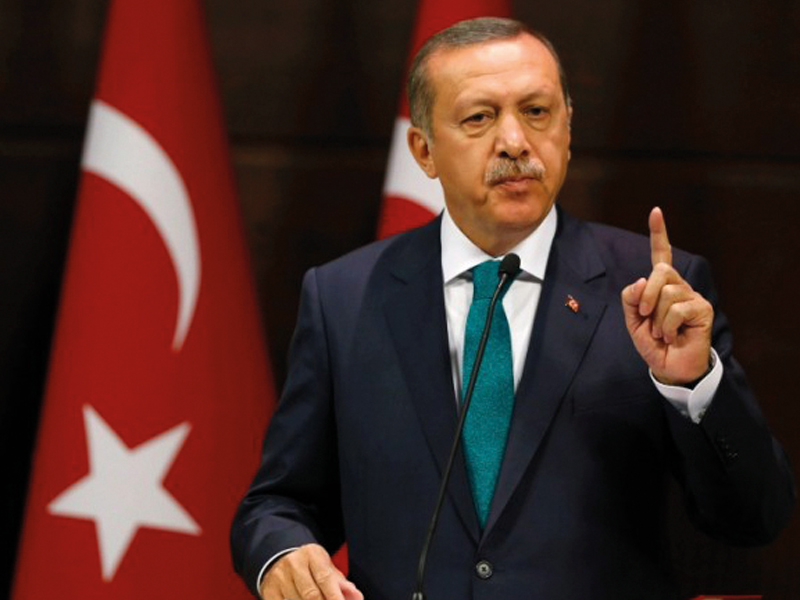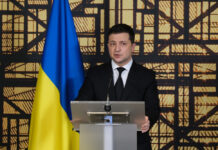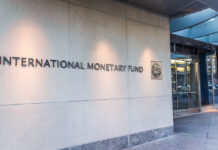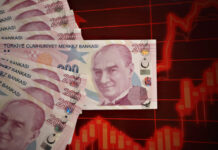Turkey’s strength has thus far been its ability to project itself as a country that has found a balance between a democratic form of government and Islam as the state religion. Serious questions are being raised as to whether Turkey can, in fact, offer a model of Islamic democracy with constitutional checks and balances necessary to preserve the democratic principles of the state. Turkey’s continued rise to prominence or its decline will depend on the preservation of that balance.
Whereas only a few people will dispute the significant economic and socio-political progress that was made under President Erdogan’s leadership, there is now a growing chorus of critics who point to the government’s backsliding on its domestic reforms as well as within its foreign relations. Serious questions are being raised as to whether Turkey can, in fact, offer a model of Islamic democracy with constitutional checks and balances necessary to preserve the democratic principles of the state.
The Erdogan government managed over the past few years to create the perception that Turkey’s rise has been based on a sound foreign policy doctrine of “zero problems with neighbours” along with solid economic development policies, while continuing social and political reforms consistent with Islamic values. A close look at reality, however, suggests a starkly different picture that raises serious concerns among Turkey’s friends and quiet jubilation amongst its enemies. There are five dimensions behind Turkey’s decline:
The first is the social dimension in which, undoubtedly, Turkey has made noteworthy progress in the last decade. The motivation behind these social reforms has, to a large extent, been Turkey’s desire to join the European Union. Since 2002, the parliament has passed several sets of reform packages to protect the rights of defenders and detainees, and guarantee freedom of speech and human rights. Addressing the Kurdish issue was an integral part of this process, and Turkey passed laws allowing Kurdish radio broadcasts as well as providing the option for private, Kurdish education.1
However, the Erdogan government has retrogressed on these reforms, partly because the EU bid seems to have faded away and partly because of the desire to remain in power without a serious challenge from the opposition. According to the Human Rights Watch 2016 World Report, the government increasingly breaches what it has committed itself to, including unjustified prosecutions for alleged speech crimes, the arbitrary use of terrorism laws, unnecessarily-prolonged pretrial detention, especially of journalists and editors, arresting Kurdish notables and intellectuals for links with the Kurdistan Workers’ Party (PKK), and returning to the old policy of massive retaliations against PKK attacks.2
Only a few months after Turkey’s President Erdogan raided the offices of the Koza Ipek Media Group, the Turkish police assaulted in March 2016 the offices of Feza Publications, which owns two newspapers (including Zaman) and two TV stations, among other media outlets, without any warning. Although Erdogan knows well that Turkey is far from being a democratic state, he continues to promote the absurd notion that Turkey is indeed a genuine democracy, stating with his usual twisted flare that “nowhere in the world is the press freer than it is in Turkey.”3 In fact, Reporters Without Borders’ 2015 World Press Freedom Index ranked Turkey 149 out of 180 countries,4 between Mexico, where journalists are regularly murdered, and the Democratic Republic of the Congo, which is a failed state.
The second dimension is the political reforms that Erdogan has embraced. The most important manifestations of these reforms have been the change in Turkey’s National Security Council (NSC) regulations to reduce the military’s power over it by increasing the number of civilian members of the NSC, and the appointment of a civilian as the NSC Secretary General.5 The 2004 constitutional amendment package also adopted measures to increase governmental transparency.
However, the Erdogan government has started in recent years to freeze these political reforms in place and empty them of their essential purpose, which is to develop a sustainable form of democratic governance. What has precipitated policy change has been the inadvertent effects that these very reforms caused, such as strengthening the power of the secularist establishment. Erdogan started using the democratic façade to direct an “electoral authoritarianism” where politically-motivated proscriptions have detained nearly one-third of the high military brass, journalists, and government opponents on alleged coup suspicions.
The third dimension is economic. The AK government embraced the free market and, because of diplomatic openings in the Middle East region, managed to open several new markets for Turkish exports. These efforts have accelerated economic growth to an unprecedented level in modern history. Turkey’s per-capita income has almost tripled, and in 2010 the economy grew at 9.2 percent (though it shrunk to a low of 2.1 percent in 2012), one of the world’s highest,6 with the Gross Domestic Product (GDP) now worth $1.6 trillion.7
Nevertheless, the so-called economic miracle has not, and is not, benefiting the Turkish population in any equitable measure. Nearly 20 million people (one quarter of the population) live under the poverty line,8 and given all other economic indicators, the economic boom proved to be unsustainable. While Turkey as a government was hard at work to create the perception of a rising star with the most competent of captains at the helm, it has allowed its self-perceived grandeur (and even arrogance) to influence both its domestic and foreign policy to the detriment of its continued successes.
The fourth dimension is foreign policy. Nothing can be more admirable in foreign policy than the doctrine and goal of ensuring “zero problems with neighbours” that then-Turkish Foreign Minister Ahmet Davutoğlu (currently Prime Minister, with the full support of Erdogan) has espoused and worked diligently to implement. Turkey overcame its problems with Syria over PKK activities and a water dispute, played a role with Brazil in reaching a deal on Iran’s nuclear fuel transfer (albeit rejected by the West), and made serious efforts to mediate peace between Syria and Israel. In addition, Turkey entered into serious negotiations to end its conflict with Armenia and Cyprus while expanding and improving its relations with Iran and Iraq.
Presently, if one takes a look at the situation country by country, the picture looks surprisingly different. There is hardly any neighbouring country that Turkey does not have some kind of problem with. Turkey’s failure to reconcile the hundred-year old dispute over the Armenian genocide continues to poison its relations, not only with Armenia but also with the United States, who takes a strong supportive position of Armenia’s grievances. The discord with Greece over Cyprus was only worsened with the dispute over exploration of gas near Turkish territorial waters. And contrary to what was recently announced in connection with the EU-Turkish agreement concerning the Syrian refugees – that Turkey’s application to join the EU will be put on the fast track – Ankara’s EU candidacy is unlikely to make any headway.
Two countries that have and will continue to impact Turkey’s geopolitical position are Iran and Syria. Although Turkey continues to enjoy, out of necessity, strong trade relations with Iran (especially in the energy sector), Ankara remains deeply concerned over Iran’s ambition to acquire nuclear weapons despite the Iran deal. Their bilateral relations are strained by Ankara’s decision to host a base for a NATO missile defense system9 and the conflict over Syria’s future. Moreover, Tehran’s and Ankara’s national interests do not coincide and in fact, the two countries are on a collision course. Syria has become the battleground between Sunnis and Shiites, and thus the emerging political order in post-Assad Syria will have a great impact on their overall relation and ambitions, as Turkey is predominantly a Sunni state and Iran is mostly Shiite.
Erdogan spoke out against the Assad regime soon after the eruption of the civil war, demanding the ouster of Assad with whom he once had close relations. Turkey also joined its allies in imposing sanctions against Syria, but refrained from taking any decisive measure other than advocating for the establishment of a no-fly zone, which the US turned down.
The influx of nearly two million Syrian refugees to Turkey thrust Turkey in the middle of the conflict in Syria and the fight against ISIS. The agreement between Turkey and the EU in connection with Syrian refugees and asylum seekers is one case in point. Being the tactician that he is, Erdogan made his move to shut down Feza Publications around the same time, knowing he would not be severely condemned by either the US or the EU for his actions.
Finally, the fifth dimension is the growing imbalance between Islam and democracy. The Erdogan government, which rode high on the premise of striking a healthy balance between democracy and religion, is encouraging the growing social and political pervasiveness of the AK party to serve its Islamic agenda. By all accounts, the government has done exactly that by increasingly embracing religiously-oriented policies both domestically and within its foreign relations.
The Erdogan government’s previous attempts at legislating the wearing of headscarves10 is a minor situation compared, for example, to the appointment of officials based on their religious credentials rather than on their professional expertise and experience. Erdogan himself might well think that this is the age of Islamism, and he further enforced the general perception, in and outside of Turkey, that he favours any organisation or country with strong Islamic credentials over others, regardless of the conflicting issues involved.
As such, Erdogan has used his strong Islamic credentials to project himself as a pious leader, when in fact he consistently engaged in favouritism, granting huge government contracts to those who supported him and to his family members, irrespective of conflicts of interest and the corruption that ensued as a result.11
Turkey’s strength has thus far been its ability to project itself as a country that has found a balance between a democratic form of government and Islam as the state religion. Turkey’s continued rise to prominence or its decline will depend on the preservation of that balance, especially at a time when the vast majority of Muslim youth throughout the Arab and Muslim world want to rid themselves of the shackles of any extremism including, if not particularly, that of a religious ilk.
Perhaps Erdogan should be reminded of what truly constitutes a democracy. Freedom of expression represents one of four critical pillars of any democratic form of government, which also includes the election of a representative government, equality before the law, and strict observance of human rights. Sadly, Erdogan did not stop at repressing freedom of expression in all forms – he regularly chipped away at the other pillars, which is bound to dismantle what is left of Turkey’s democracy.
Time and again, Erdogan demonstrated his lack of tolerance to opposing views and found the press to be a nuisance, as it was generally critical of his Islamic agenda. He understood, as George Orwell aptly put it, “Freedom of the press, if it means anything at all, means the freedom to criticise and oppose”,12 a freedom which Erdogan is bent on suppressing. Indeed, there is little else more injurious to any democracy than closing down news outlets and choking off freedom of speech.
To be sure, Erdogan’s appetite for increasing power, harsh treatment of dissidents, religious zeal, and narcissistic predisposition made him feared by much of Turkish society yet admired by others; he is almost unanimously reviled by the international community, but dealt with out of necessity. Being that Turkey now faces a historic crossroad, the choices Erdogan will make in the months and years to come will have a lasting effect on Turkey’s future. There are limits as to how much longer the Turkish people will tolerate not only the stifling of free speech and human rights abuses, but Erdogan’s draconian style of governing before they rise against him.
Erdogan should know that for Turkey to capture its rightful place as a regional power and significant player on the international stage, he must restore all that the country has lost in the past few years, especially its democratic foundation. Without such democratic principles, Turkey will be further alienated from the Western countries, the bloc to which Turkey should belong, and will be unable to harness its true potential.
Featured image courtesy of: middleeastobserver.org
About the Author
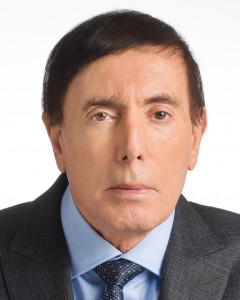 Dr. Alon Ben Meir is a professor and Senior Fellow at New York University’s Center for Global Affairs. Dr. Ben-Meir is an expert on Middle East politics and affairs, specialising in international negotiations and conflict resolution, and is involved in Track-II diplomacy.
Dr. Alon Ben Meir is a professor and Senior Fellow at New York University’s Center for Global Affairs. Dr. Ben-Meir is an expert on Middle East politics and affairs, specialising in international negotiations and conflict resolution, and is involved in Track-II diplomacy.
References
1. Fréderike Geerdink, “Kurds not giving up on education in mother tongue,” Al Monitor, 23 September 2014, http://www.al-monitor.com/pulse/originals/2014/09/turkey-kurds-education-in-mother-tongue-schools.html.
2. “World Report 2016,” Human Rights Watch, 2016, https://www.hrw.org/world-report/2016/country-chapters/turkey.
3. Ben Tufft, “President Erdogan claims press in Turkey is freer than anywhere else in the world,” Independent, 29 December 2014, http://www.independent.co.uk/news/world/europe/president-erdogan-claims-press-in-turkey-is-freer-than-anywhere-else-in-the-world-9948309.html.
4. “2015 World Press Freedom Index,” Reporters Without Borders, accessed 1 April 2016, https://index.rsf.org/#!/.
5. Vincent Boland, “Turkey to appoint first civilian to policy body,” Financial Times, 6 August 2004, http://www.ft.com/cms/s/0/d66f56c6-e744-11d8-aff8-00000e2511c8.html#axzz45XG1zfEj.
6. “GDP Growth (annual %),” The World Bank, accessed 1 April 2016, http://data.worldbank.org/indicator/NY.GDP.MKTP.KD.ZG?page=1.
7. “Turkey,” The World Factbook, accessed 1 April 2016, https://www.cia.gov/library/publications/the-world
-factbook/geos/tu.html.
8. Zülfikar Doğan, “Turkey’s poverty figures look bad for ruling AKP,” Al Monitor, 15 May 2015, http://www.al-monitor.com/pulse/originals/2015/05/turkey-official-poverty-figures-corner-government.html#.
9. Burak Bekdil, “Raytheon: No US block on Patriot sales to Turkey,” Hurriyet Daily News, 18 April 2013, http://www.hurriyetdailynews.com/raytheon-no-us-block-on-patriot-sales-to-turkey.aspx?pageID=238&nID=45107&NewsCatID=345.
10. Pinar Tremblay, “Headscarf protests resume in Turkey,” Al Monitor, 16 September 2014, http://www.al-monitor.com/pulse/originals/2014/09/turkey-headscarves-protestes-resumes-education.html#.
11. “Freedom in the World,” Freedom House, 2016, https://freedomhouse.org/report/freedom-world/2016/turkey.
12. George Orwell, “The Prevention of Literature,” Polemic, No. 2 (1946), http://www.orwell.ru/library/essays/prevention/english/e_plit.



